高中英语语法之四种名词性从句
英语语法名词性从句知识:四组名词性从句
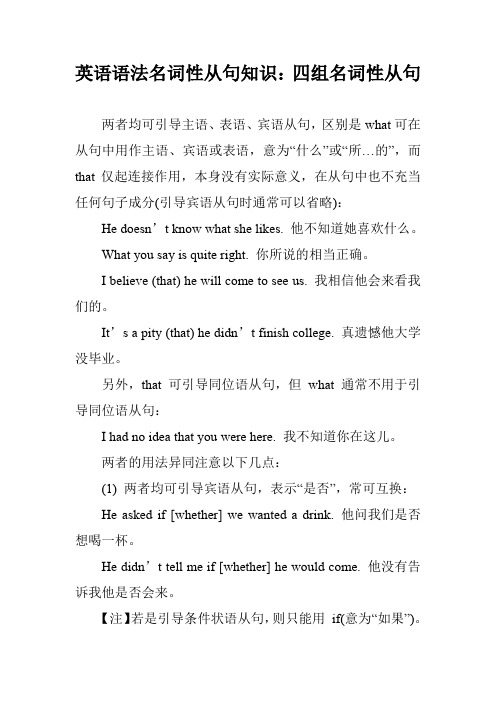
英语语法名词性从句知识:四组名词性从句两者均可引导主语、表语、宾语从句,区别是what可在从句中用作主语、宾语或表语,意为“什么”或“所…的”,而that仅起连接作用,本身没有实际意义,在从句中也不充当任何句子成分(引导宾语从句时通常可以省略):He doesn’t know what she likes. 他不知道她喜欢什么。
What you say is quite right. 你所说的相当正确。
I believe (that) he will come to see us. 我相信他会来看我们的。
It’s a pity (that) he didn’t finish college. 真遗憾他大学没毕业。
另外,that 可引导同位语从句,但what 通常不用于引导同位语从句:I had no idea that you were here. 我不知道你在这儿。
两者的用法异同注意以下几点:(1) 两者均可引导宾语从句,表示“是否”,常可互换:He asked if [whether] we wanted a drink. 他问我们是否想喝一杯。
He didn’t tell me if [whether] he would come. 他没有告诉我他是否会来。
【注】若是引导条件状语从句,则只能用if(意为“如果”)。
(2) 当引导一个否定的宾语从句时,通常用if 而不用whether:I don’t care if it doesn’t rain. 我不在乎天是否下雨。
【注】在个别词语(如wonder, not sure 等)后的从句否定式有时也可用whether 引导:I wonder if [whether] he isn’t mistaken. 我想知道他是否错了。
(3) 以下情况通常要用whether 而不用if:①引导宾语从句且置于句首时:Whether he has left, I can’t say. 他是否走了,我说不定。
高中英语语法讲义——名词性从句(主从、表从、宾从,同从)
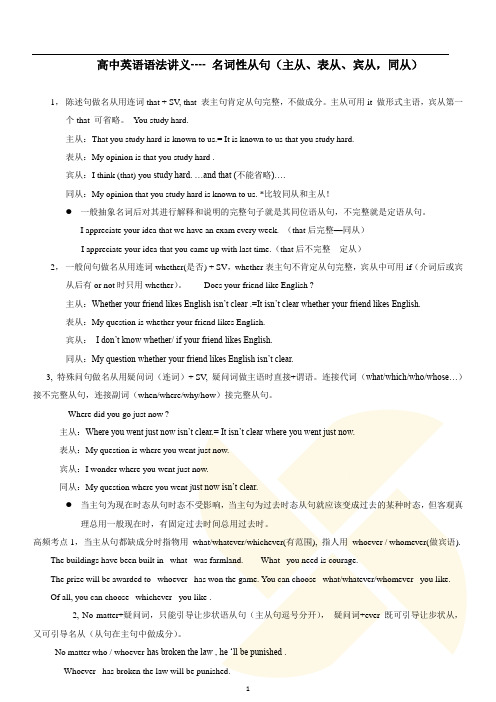
高中英语语法讲义---- 名词性从句(主从、表从、宾从,同从)1,陈述句做名从用连词that + SV, that 表主句肯定从句完整,不做成分。
主从可用it 做形式主语,宾从第一个that 可省略。
You study hard.主从:That you study hard is known to us.= It is known to us that you study hard.表从:My opinion is that you study hard .宾从:I think (that) you study hard. …and that (不能省略)….同从:My opinion that you study hard is known to us. *比较同从和主从!●一般抽象名词后对其进行解释和说明的完整句子就是其同位语从句,不完整就是定语从句。
I appreciate your idea that we have an exam every week. (that后完整—同从)I appreciate your idea that you came up with last time.(that后不完整---定从)2,一般问句做名从用连词whether(是否) + SV,whether表主句不肯定从句完整,宾从中可用if(介词后或宾从后有or not时只用whether)。
Does your friend like English ?主从:Whether your friend likes English isn’t clear .=It isn’t clear whether your friend likes English.表从:My question is whether your friend likes English.宾从:I don’t know whether/ if your friend likes English.同从:My question whether your friend likes English isn’t clear.3, 特殊问句做名从用疑问词(连词)+ SV, 疑问词做主语时直接+谓语。
2023届高考英语语法名词性从句精讲之四大从句用法大全讲义
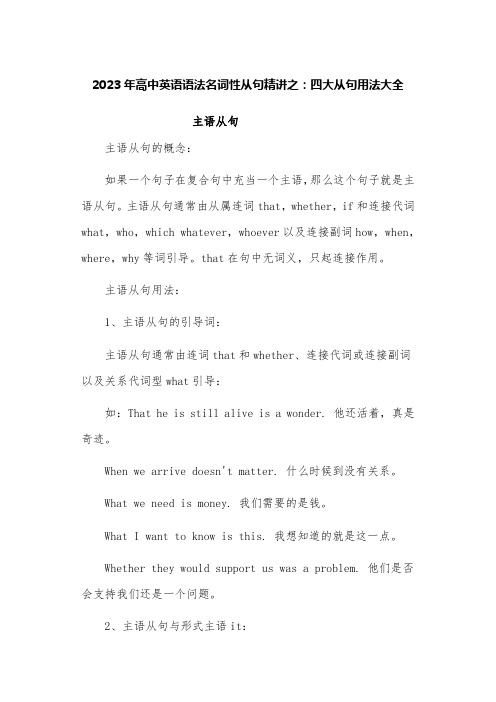
2023年高中英语语法名词性从句精讲之:四大从句用法大全主语从句主语从句的概念:如果一个句子在复合句中充当一个主语,那么这个句子就是主语从句。
主语从句通常由从属连词that,whether,if和连接代词what,who,which whatever,whoever以及连接副词how,when,where,why等词引导。
that在句中无词义,只起连接作用。
主语从句用法:1、主语从句的引导词:主语从句通常由连词that和whether、连接代词或连接副词以及关系代词型what引导:如:That he is still alive is a wonder. 他还活着,真是奇迹。
When we arrive doesn't matter. 什么时候到没有关系。
What we need is money. 我们需要的是钱。
What I want to know is this. 我想知道的就是这一点。
Whether they would support us was a problem. 他们是否会支持我们还是一个问题。
2、主语从句与形式主语it:有时为了考虑句子平衡,通常在主语从句处使用形式主语it,而将真正的主语从句移至句末。
这分三种情况:(1)对于以连词that引导的主语从句,通常用形式主语代主语从句:如:It's a pity that he didn't come. 很遗憾他没来。
(2)对于以连接代词(副词)引导的主语从句,可以使用形式主语代主语从句,也可直接在句首使用主语从句:如:Whether they would support us was a problem. 他们是否会支持我们还是一个问题。
It was a problem whether they would support us. 他们是否会支持我们还是一个问题。
(3)对关系代词型what引导的主语从句,通常不用形式主语,总是主语从句放在句首:如:What we need is money. 我们需要的是钱。
高中英语语法:名词性从句知识汇总

高中英语语法:名词性从句知识汇总在复合句中具有名词的性质的作主语、表语、同位语、宾语的从句叫名词性从句。
因此,我们把主语从句、表语从句、同位语从句和宾语从句这四种从句统称为名词性从句。
当名词性从句要采用陈述句语序。
由一个含疑问意义的连词引起时,必须将该连词放在名词性从句的开头,且该从句语序不能倒装。
一、引导名词性从句的关联词引导名词性从句的关联词大致相同,它们分别是:连词:that, whether, if;关系代词:who, what, which , whom, whose, whatever, whoever, whomever, whichever;关系副词:when, where, how, why, however, whenever, wherever。
引导从句时一般不用逗号和主句分开。
连词that在从句中不作成分,不含疑问意义;而wh-连词在从句中作成分,且含有疑问意义;或what/where从句相当于一个名词后加一个定语从句。
It worried her a bit that her hair was turning grey.她的头发在变白令她有点担忧。
(that在从句中只起引导词作用,不作成分)What caused the accident is still a complete mystery.事故发生的原因仍然是个不解之谜。
(What在从句中作主语)2、that与whether引导名词性从句的区别。
(1)动词doubt表示“怀疑、不知道”解时,肯定句接whether引导的宾语从句;否定句don’t doubt和疑问句Do you doubt要接that引导的从句。
I don’t doubt that he will come soon.我不怀疑他不久会来。
(此处不用whether)Can you doubt that he will win?你怀疑他会赢吗?(此处不用whether)比较:doubt表示“不信”解时,表示强烈的不相信时,在陈述句中可接that从句。
高中英语语法名词性从句

规律一:名词性从句在句中要用陈述语序
II.引导词的选择
1. ____ we can't get seems better than ____ we
have. A.What , what C. That , that
B. What , that D. That , what
2. It worried her a bit ____ her hair was turning grey. A.while C.if B.that D.for
规律四:主语从句和宾语从句在适当的情况 下可以借助 “it” 而后置。
1.主语从句可以用it (作形式主语) 来替换成以下几种结构表达。 (A)It is clear/certain/likely /true/surprising that… (B)It is a pity/shame /good idea/no wonder that ...
The question of whether they are male or female is not important. I have not decided whether to go or not.
⑥ whether可引导一个让步状语从句表示 “不管”、“无论”,而if不能,但可以 引导一个条件状语从句表示“如果”如:
• (4)同位语从句 • 就是在句中作同位语的从句。它通常有放在thought, idea, news, word(=news), plan, doubt, question, fact, suggestion, belief等抽象名 词的后面,说明这些词的具体内容或含义。同位语从句大多由that引 导,也可由whether, how, when, where, why等引导,但不能由which 引导。如: • The idea that the earth is round is not a new one. “地球是圆的”这种 观点并不新鲜。He must answer the question whether he agrees to it or not. 他必须回答他是否同意此事这们一问题。 • I have no idea when he will set out. 我不知他什么时候出发。 • 注:有时,同位语从句并不紧跟在它所说明的词的后面。如: • The whole truth came out at last that he was a wolf in sheep’s clothing. 真相终于大白了,他原来是一只披羊皮的狼。
【语法】名词性从句(一)
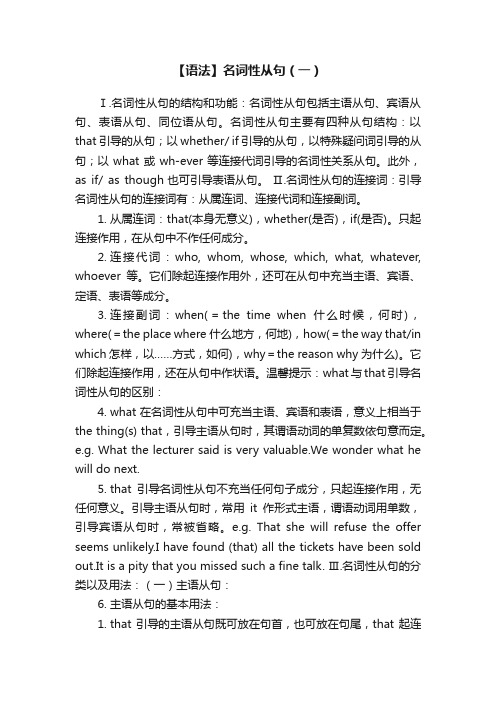
【语法】名词性从句(一)Ⅰ.名词性从句的结构和功能:名词性从句包括主语从句、宾语从句、表语从句、同位语从句。
名词性从句主要有四种从句结构:以that引导的从句;以whether/ if引导的从句,以特殊疑问词引导的从句;以what或wh-ever等连接代词引导的名词性关系从句。
此外,as if/ as though也可引导表语从句。
Ⅱ.名词性从句的连接词:引导名词性从句的连接词有:从属连词、连接代词和连接副词。
1.从属连词:that(本身无意义),whether(是否),if(是否)。
只起连接作用,在从句中不作任何成分。
2.连接代词:who, whom, whose, which, what, whatever, whoever等。
它们除起连接作用外,还可在从句中充当主语、宾语、定语、表语等成分。
3.连接副词:when(=the time when什么时候,何时),where(=the place where什么地方,何地),how(=the way that/in which怎样,以……方式,如何),why=the reason why为什么)。
它们除起连接作用,还在从句中作状语。
温馨提示:what与that引导名词性从句的区别:4.what在名词性从句中可充当主语、宾语和表语,意义上相当于the thing(s) that,引导主语从句时,其谓语动词的单复数依句意而定。
e.g. What the lecturer said is very valuable.We wonder what he will do next.5.that引导名词性从句不充当任何句子成分,只起连接作用,无任何意义。
引导主语从句时,常用it作形式主语,谓语动词用单数,引导宾语从句时,常被省略。
e.g. That she will refuse the offer seems unlikely.I have found (that) all the tickets have been sold out.It is a pity that you missed such a fine talk. Ⅲ.名词性从句的分类以及用法:(一)主语从句:6.主语从句的基本用法:1.that引导的主语从句既可放在句首,也可放在句尾,that起连接作用,无词义,在从句中不作成分,一般不能省略。
高中英语语法---名词性从句详解
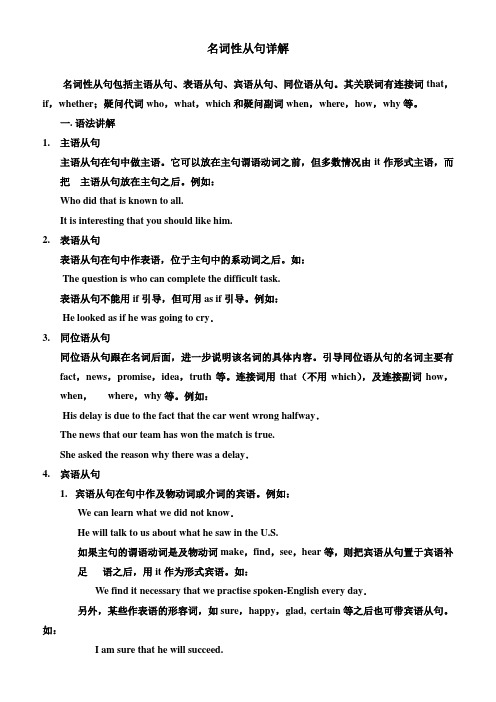
名词性从句详解名词性从句包括主语从句、表语从句、宾语从句、同位语从句。
其关联词有连接词that,if,whether;疑问代词who,what,which和疑问副词when,where,how,why等。
一.语法讲解1.主语从句主语从句在句中做主语。
它可以放在主句谓语动词之前,但多数情况由it作形式主语,而把主语从句放在主句之后。
例如:Who did that is known to all.It is interesting that you should like him.2.表语从句表语从句在句中作表语,位于主句中的系动词之后。
如:The question is who can complete the difficult task.表语从句不能用if引导,但可用as if引导。
例如:He looked as if he was going to cry.3.同位语从句同位语从句跟在名词后面,进一步说明该名词的具体内容。
引导同位语从句的名词主要有fact,news,promise,idea,truth等。
连接词用that(不用which),及连接副词how,when,where,why等。
例如:His delay is due to the fact that the car went wrong halfway.The news that our team has won the match is true.She asked the reason why there was a delay.4.宾语从句1.宾语从句在句中作及物动词或介词的宾语。
例如:We can learn what we did not know.He will talk to us about what he saw in the U.S.如果主句的谓语动词是及物动词make,find,see,hear等,则把宾语从句置于宾语补足语之后,用it作为形式宾语。
202X届高考英语语法名词性从句精讲之四大从句用法大全讲义
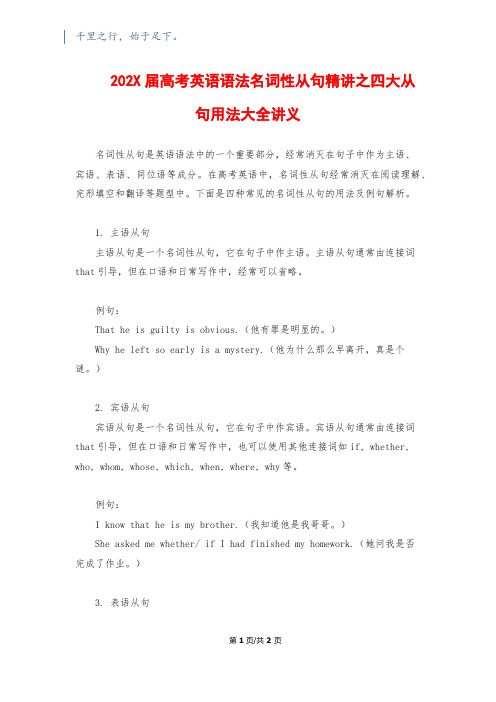
千里之行,始于足下。
202X届高考英语语法名词性从句精讲之四大从句用法大全讲义名词性从句是英语语法中的一个重要部分,经常消灭在句子中作为主语、宾语、表语、同位语等成分。
在高考英语中,名词性从句经常消灭在阅读理解、完形填空和翻译等题型中。
下面是四种常见的名词性从句的用法及例句解析。
1. 主语从句主语从句是一个名词性从句,它在句子中作主语。
主语从句通常由连接词that引导,但在口语和日常写作中,经常可以省略。
例句:That he is guilty is obvious.(他有罪是明显的。
)Why he left so early is a mystery.(他为什么那么早离开,真是个谜。
)2. 宾语从句宾语从句是一个名词性从句,它在句子中作宾语。
宾语从句通常由连接词that引导,但在口语和日常写作中,也可以使用其他连接词如if, whether, who, whom, whose, which, when, where, why等。
例句:I know that he is my brother.(我知道他是我哥哥。
)She asked me whether/ if I had finished my homework.(她问我是否完成了作业。
)3. 表语从句第1页/共2页锲而不舍,金石可镂。
表语从句是一个名词性从句,它在句子中作表语。
表语从句通常由连接词that引导,但在口语和日常写作中,经常可以省略。
例句:The fact that he is a doctor surprises me.(他是个医生这个事实让我感到惊异。
)4. 同位语从句同位语从句是一个名词性从句,它在句子中同其他名词一起充当同位成分,对前面的名词进行解释或说明。
同位语从句通常由连接词that引导。
同位语从句常用来解释或说明名词的内容、定义、解释、后果、缘由、依据等。
例句:The fact that he failed the exam surprised us all.(他考试失败这个事实让我们全部人都感到惊异。
- 1、下载文档前请自行甄别文档内容的完整性,平台不提供额外的编辑、内容补充、找答案等附加服务。
- 2、"仅部分预览"的文档,不可在线预览部分如存在完整性等问题,可反馈申请退款(可完整预览的文档不适用该条件!)。
- 3、如文档侵犯您的权益,请联系客服反馈,我们会尽快为您处理(人工客服工作时间:9:00-18:30)。
四种名词性从句(宾语从句、主语从句、同位语从句、表语从句)讲解与练习◆学习宾语从句学习宾语从句的连词、语序、时态和各种变化及特殊用法(直接引证变间接引语也在宾语从句的基础上还要进行人称、状语、少数动词和句型的变化)是为学习其它三种名词性从句(主从、表从、同位从)做铺垫,连词、语序、时态基本相同,只是后三种考点相对宾.语从句少的多,主要是对连词的应用进行考查。
所以学好宾语从句是必要的。
宾语从句三注意三特殊一注意:注意引导词(连词)由陈述句转化而来的宾语从句,引导词为that,that 在口语或非正式文体中可省略;由一般疑问句转化而来的宾语从句,引导词为if或whether;由特殊疑问句转化而来的宾语从句,引导词为句子本身的特殊疑问词,即what, when,where 等。
Eg:Tom says(that)he will fly to Beijing tomorrow.汤姆说他明天将要坐飞机去北京二注意:注意从句语序.宾语从句的语序应该为陈述句语序即“主语+谓语+宾语+其他”。
也就是说将疑问句转化成宾语从句时,一定要将疑问句语序转变成陈述句语序。
Can you tell me what he is doing能告诉我他正在做什么吗?<特别提醒>当疑问句在宾语从句中做主语时,语序不变。
Eg:Do you know what makes him so angry?你知道什么事使他如此生气吗?<特别提醒>如果宾语从句表示的是客观真理或是科学事实,其谓语动词仍用一般现在.时态。
Eg:Our teacher told us that the sun is much bigger than the moon.老师告诉我们说太阳比月球大得多。
◆主语从句(与宾词从句连词、语序、时态相同。
只是不能用if, that 不可省;)(一)、主语从句是一个句子,在句子中作主语成分。
(二),主语从句的特点1.与宾语从句使用同样的连接词,只是if不能用;1)、陈述句用that。
2)、一般疑问句用whether。
3)、特殊疑问句用特殊疑问词what, which, who,when, where, why, how等词引导。
2.以it为形式主语出现Eg:1.It's true that the earth is round.That the earth is round is true.2.表是否的意思时,不能用if代替whether.It hasn't been decided whether he'll come or not.Whether he'll come or not hasn't been decided.3.从句语序为主谓宾正常语序。
Why didn't he come?Why he didn't come is not known.(三)特殊疑问词变化Whoever=no matter who=any one whoWhomever=no matter who=any one whoWhoseever=no matter whose=any one whoseWhichever=no matter which=any one whichWhatever=no matter what=anything thatWhat=先行词+which/that◆同位语从句(一)、理解同位语从句的含义,把握同位语从句的实质1、在主从复合句中作同位语的从句称为同位语从句;所用连词与宾语从句(除不能用if)和主语从句相同2、连词1)、陈述句用that。
2)、一般疑问句用whether.3)、特殊疑问句用特殊疑问词what, which, who,when, where, why, ho等词引导。
3、常放在fact,news,idea,truth,hope,problem,information,wish, promise, answer, evidence, report,explanation, suggestion, conclusion等抽象名词后面,说明该名词的具体内容。
换言之,同位语从句和所修饰的名词在内容上为同一关系,对其内容作进一步说明。
例: The news that they had won the game soon spread over the whole school他们比赛获胜的消息很快传遍了整个学校。
析: they had won the gan说明The news的全部内容,因此该句为同位语从句。
.(二)、正确运用同位语从句的引导词,准确把握同位语从句1.如同位语从句意义完整,应用that引导同位语从句。
(即that不充当任何成分,只起连接作用)例:The general gave the order that the soldiers should Cross the river at once将军下达了战士们立即过河的命令。
析: the soldiers should cross the river at o显the order的全部内容,且意义完整,因此应用that引导同位语从句。
2.如一般疑问句whether做同位语从句的连词,译成"是否" (if 不能引导同位语从句)。
例: We'll discuss the problem whether the sports meeting will be held on time我们将讨论运动会是否会如期举行的问题。
析: the sports meeting will be held on tim般疑问句做同位语从句,原句为: Will the sports meeting be held on time?3.如同位语是特殊疑问句做同位语从句,连词就应用when,where,how等疑问词引导例1: I have no idea when he will be back.析: when he will be back原句为When will he be back?例2: I have no impression how he went home,perhaps by bike.析:How did he go home是原句,连词就How.4.当主句的谓语较短,而同位语从句较长时,同位语从句常后置。
如: The thought came to him that maybe the enemy had fled the city他突然想到敌人可能已经逃出城了。
(三)、把握同位语从句和定语从句的区别,明确同位语从句和相似从句的界限同位语从句和定语从句相似,都放在某一名词或代词后面,但同位语从句不同于定语从句。
同位语从句对名词加以补充说明,是名词全部内容的体现,且名词和同位语从句的引导词均不在从句中作成分;定语从句说明先行词的性质与特征,与先行词是修饰与被修饰的关系, 且名词和定语从句的引导词均在从句中作成分。
区分时可以在先行词与与从句之间加一个系动词be,使之构成-一个新句子,如果句子通顺且符合逻辑,则为同位语从句,反之,则为定语从句。
如: The report that he was going to resign was false.他将辞职的传闻是假的。
因为the report was that he was going to resign句意通顺,所以that he was going to resig显同位语从句。
表语从句1、概述用作表语的从句叫作表语从句,它位于主句中的连系动词之后。
2、引导表语从句的词有从属连词(所用连词与宾语从句(除不能用if) .和主语从句相同、同位语从句相同),不同之处还可用because,As if;as though引导。
1)、陈述句用that。
2)、一般疑问句用whether。
3)、特殊疑问句用特殊疑问词what, which, who,when, where, why, howThat引导表语从句时,在口语中,间或可以省略4、陈述句做表语从句连词that,that 在引导表语从句时无词义。
.一.般疑问句用whether引导,whether 有词义,意为、“是否”。
这时主句的主语常常是些抽象名词,如question(问题), trouble(麻烦), problem(问题), result(结果),chance(可能性),suggestion(建议),idea(想法),reason(理由)等。
表语从句对主句主语进行说明、解释,使主语的内容具体化。
5、由疑问词引导的表语从句。
who, what, which, whom, whose, whatever, whoever, whomever, whichever引导表语从句,在句中作主语、宾语、表语,疑问代词不能省略。
6、由连词because, as if/as though等引导的表语从句。
(1) I don't know _________or notA. whether he is at homeB.if he Is at homeCthat he is at homeD.whether is he at home(2) This depends on t_________he weather is .fineA. whichB.whetherC. ifD. that(3) The teacher asked the new student_________class he was inA. whichB.whereC. ifD. that(4) I don't know_________Mr Green will come to see us.He 'll help us with our EnglishA.whyB. whenC.howD. where(5)Be careful!Don't break the bottles Do you hear_________I said? David?Yes,MumA. whatB. thatC. whyD. if类型二:宾语从句的语序一陈述句语序(1)Did you find out________?A.she was looking for whose childB.whose child was she looking forC.whose child she is looking forD. whose child she was looking for(2)Are you interested in________?A.how did he do itB.he did It howC.how he did itD.he how did it( 3)I don't know ________Can you tell me?A. how the two players are oldB. how old are the two playersC.the two players are how oldD. how old the two players are(4)--- What did the scientist say?---He said he wondered if________ into space by spaceship one dayA. he had to flyB. he could flyC. can he flyD. could he fly(5)Excuse me, sir. Could you tell meA. Where the bank nearestB. where is the nearest bankC. where the nearest bank isD. the nearest bank is where类型三:时态(1) It's 7: 30. I can't believe you___ cooking dinner , yet Sally.A. haven't startedB. didn'tC. don't startD hadn't started(2)The teacher told us yesterday that December 25________Christmas DayA. isB. wasC.has beenD. will be .(3)The teacher said that the earth________round the. sunA. goes .B. goC. wentD. will go( 4)We 'd like to tell you that you________the examA. have passedB. had passedC. pass .D. will pass ,( 5)“Could you tell me________?“Yes They ________to the library"A. where are the twins have beenB.where were the twins have beenC. where the twins are have goneD,where the twins were have gone类型一: ABABA类型二DCDBC类型三AAAAC。
